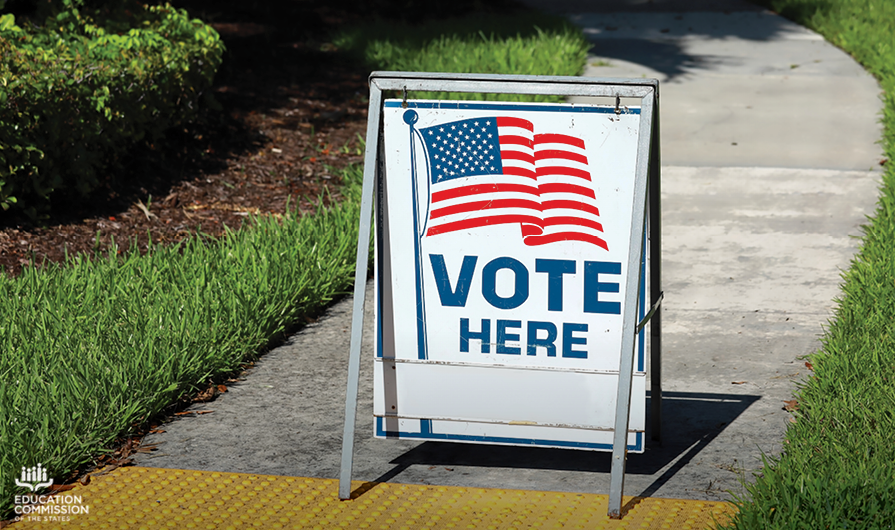The 2022 general elections could reshape the education landscape in much of the country as education issues continue to be a top priority among candidates and the public.
Voters in nearly every state will head to the ballot box or mail slot to select their leadership in key political leadership roles, including gubernatorial races in 36 states and legislative races in 87 of the 99 chambers around the country. We track each of these races, as well as those for chief state school officers, state boards of education and ballot initiatives to keep you informed on what these potential changes may mean for state leaders, educators, students and their families.
Gubernatorial Races
In particular, governors’ races can lead to significant changes in state priorities. This year, 36 states are electing a governor. Of those 36 states, eight are assured to see a new governor, either because of term limits or, in the case of Massachusetts, Gov. Charlie Baker declining to run for re-election.
Governors are influential not only in their ability to set the political tone of a state, but also through their responsibility to appoint key education leadership roles in states. For instance, of the eight states that are guaranteed to see a new governor, Oregon and Pennsylvania are two where the governor directly appoints the chief state school officer. The remaining five states — Arkansas, Hawaii, Maryland, Massachusetts and Nebraska — have chief state school officers appointed by the state board of education. And in four of those states — all but Nebraska — at least one member of the state board is appointed by the governor with confirmation of the Senate.
Chief State School Officers
The last year has seen significant change in chief state school offices. Since July 2021, at least nine states have a newly appointed chief, and four others — Alaska, Mississippi, Ohio and Pennsylvania — are at different points in the selection process.
This November will see elections for state education chiefs in seven states — Arizona, California, Georgia, Idaho, Oklahoma, South Carolina and Wyoming. In Arizona, California and Georgia, there are incumbents in the race — Kathy Hoffman, Tony Thurmond and Richard Woods, respectively. While in Idaho, Oklahoma, South Carolina and Wyoming, we’re guaranteed a new chief. In Idaho and Wyoming, the incumbent chief state school officers lost in their primary races. In South Carolina, Molly Spearman declined to seek a third term. And, in Oklahoma, Joy Hofmeister is running for governor.
State Boards of Education
Of the 36 states with gubernatorial elections this year, 26 have governance structures where the governor appoints at least one member to the state board of education. Of those, seven states — Arizona, Arkansas, Hawaii, Maryland, Massachusetts, Oregon, and Pennsylvania — are guaranteed to have a new governor and, therefore, likely to see at least one new state board of education member.
Additionally, eight states — Alabama, Colorado, Kansas, Michigan, Nebraska, Ohio, Texas and Utah — as well as the District of Columbia will hold independent, direct elections for state board of education members.
Legislative Elections
Of the 99 legislative chambers across the country, 87 will be holding elections. Only New Jersey, Virginia, Mississippi and Louisiana are without legislative elections this year.
Heading into November, Democrats control 36 chambers nationwide, while Republicans hold 62. The Alaska House of Representatives operates under a unique power-sharing agreement, and Nebraska’s Legislature is, of course, unicameral and nonpartisan.
Our policy team has identified at least 151 education-related standing committees around the country. Of those committees, at least seven chairs are facing term limits and at least three failed to advance past their primary races. In addition to those, at least 25 education committee chairs have declined to seek another term for various reasons. This means that nearly one-quarter of education committees are assured to see new leadership in 2023 — all before November elections take place.
Ballot Initiatives
Finally, we also track education-related ballot measures around the country, including six referendums, measures referred to the ballot by state legislatures, and one initiative in California referred to the ballot by citizens:
- Arizona — C.R. 1044, on the ballot as Proposition 308, would reverse the 2006 Proposition 300 and allow noncitizen students to receive in-state tuition at any university under the jurisdiction of the Arizona Board of Regents or at community colleges. Eligibility requires that students attend and graduate from a public or private high school in Arizona.
- California — Proposition 28 increases arts and music education funding. The increased amount is one-half of 1% of the state’s mandatory education spending, an estimated $1 billion annually.
- Colorado — Proposition FF would create the Healthy School Meals for All program to reimburse school food authorities to provide free meals to all students, offer grants, increase employee wages, and provide assistance through local purchasing technical assistance and education grants. The measure would be funded through changing the cap on state income tax itemized deductions and require all tax revenue to be appropriated to fund the program.
- Massachusetts — Question 1 would provide resources for public education and public colleges and universities, among other things. Funds for the resources would be provided through a 4% increase to taxable income in excess of $1 million.
- New Mexico — Constitutional Amendment 1 would allocate 1.25% of the five-year average of the year-end market value of the Land Grant Permanent Fund to be distributed for enhanced instruction for early childhood education and students at risk of academic failure, extending the school year and public school teacher compensation.
- New Mexico — Bond Question 3 would authorize the issuance of an obligation bond not to exceed $215,986,000 for capital improvements and acquisitions at higher education institutions, special education schools and tribal schools. The measure would establish a general property tax imposition and levy to pay for the principal, interested and expenses of the bond.
- West Virginia — Amendment No. 4 clarifies that the policymaking and rule-making authority of the State Board of Education is subject to legislative review, approval, amendment or rejection.
Our elections coverage will continue following the election with new blog posts that recap major state races and introduce the platforms of newly elected governors. We’ll also highlight the release of our printable 2023 elections infographic. Stay tuned for updates!











